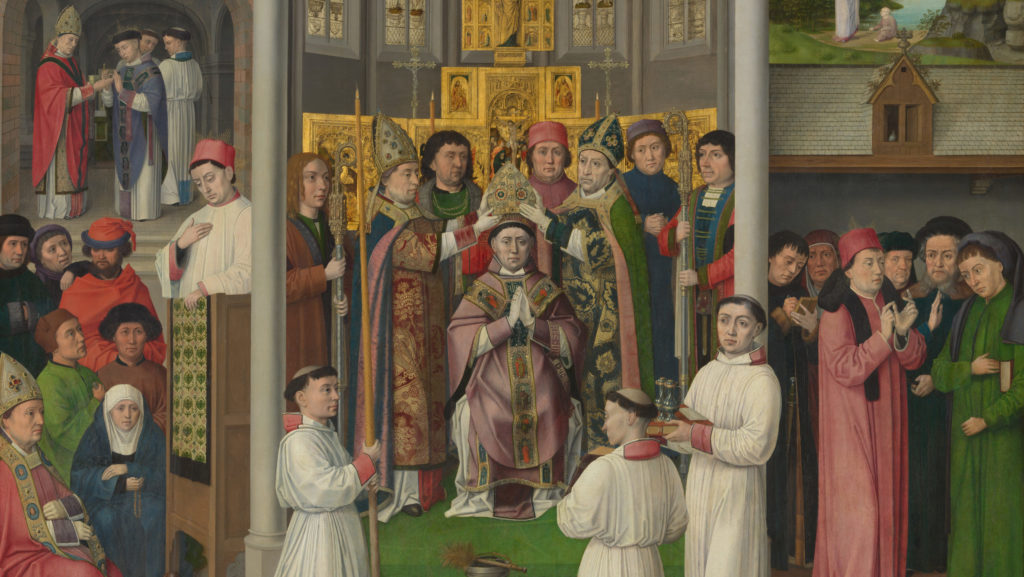Recently I celebrated the centenary Mass at Our Mother of Good Counsel Church in Los Angeles, a parish run by the Augustinian religious order.
Pope Leo XIV, an Augustinian, sent a personal message to the parish, which is named for a 600-year-old miraculous image that our new Holy Father has special devotion to.
In fact, for his first trip outside the Vatican he chose to pray before the original image at the Shrine of the Mother of Good Counsel in Genazzano, near Rome.
Since Leo’s election, I keep reading and thinking more about St. Augustine. This saint has been a spiritual companion throughout my years as a priest and bishop, one I have often turned to in my preaching and writing.
Although he lived in the fifth century, his story has always struck me as modern.
Augustine was a seeker, looking for the truth about his life and how he should live. He sought this truth in philosophy and politics, in other religions, became tangled up in the sins of the flesh and false ideologies. At 19 he took a mistress and had a child with her.
No path he followed brought him happiness. Through it all his long-suffering Christian mother, St. Monica, was praying and offering sacrifices for him.
One day while reading the Scriptures, God touched Augustine’s heart. In his autobiography, he later wrote: “You have made us for yourself, O Lord, and our heart is restless until it rests in you.”
Augustine’s insight is the foundation of “For Greater Things You Were Born,” my 2016 pastoral letter on the meaning of the human person.
Augustine would understand this moment in our society: the violence and instability in the air, the breakdown of trust in institutions, the deep suspicion that divides neighbor from neighbor.
In his unfinished masterpiece, “The City of God,” he wrote about “wars of a worse kind, namely social and civil wars,” and warned against those who have “lost all human feeling.”
Today, Augustine would call us back to what we have lost: “frugality and self-control … fidelity to the marriage bond, and chaste, honorable, and upright character. When a country is distinguished for these qualities, it may truly be said to be in full flower.”
He would remind us that the command to love our neighbor means being peacemakers. He would urge a simple path to social peace: “First, to do no harm to anyone, and second, to help everyone wherever possible.”
Augustine was a hopeful man. He once preached about how “the world smiles on us with many things.”
So long as there is the human heart, there is the chance to make a new beginning. As he said: “That a beginning be made man was created.”
His point is that the renewal of society begins with you and me, in our decision to love Jesus as he has loved us, in our choice to trust in his love and seek the good, the true, and the beautiful.
“Let our lives be good, and the times will be good,” he believed. “We make our times. Such as we are, such are the times.”
We cannot control our neighbors’ actions or convert them to the good life, Augustine taught.
What we can do is trust that God has a plan for this world he created, and we can respond with all our hearts to the call of love that he makes to each of us, by living with honor and virtue and with generous love for others.
Pope Leo recently quoted Augustine’s exhortation: “Love what you will be.” It is a beautiful reminder that God’s love calls us into existence and makes our whole lives an adventure of living with him and following him in love.
Augustine challenged us: “Do you wish to see the quality of love? See where it leads!” We hear the echoes of Jesus’ first invitation to his followers: “Come and you will see.”
God is still speaking to our restless hearts. And the more we respond to the voice we hear, the more we become the people he wills us to be.
And this is how we change the world.
In one of his last letters, written just two years before his death, we find the 74-year-old bishop fighting to end the African slave trade.
For Augustine, God’s call of love meant always defending human dignity, healing the wounds of sin, overcoming disagreements and building friendships, recognizing in others what we see in ourselves: the image of God and a restless heart that will find peace only in him.
This is his wisdom for us.
Pray for me and I will pray for you.
May our Mother of Good Counsel bring us light for our minds and strength for our hearts as we seek to follow her Son’s will in this moment.

